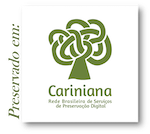A complex approach to technology-mediated task-based learning
Resumo
The focus of this study is the process of teaching/learning English as a second language in CALL, emphasizing oral interaction in an environment mediated by a synchronous communication tool using Task-Based Learning (TBL) under the perspective of the Complexity Theory. It aims to analyze and define the task cycle as a Complex Adaptive System. The current study adopts a netnographic methodology that deals with theory and practice adapting the ethnographic method to include the influence of the internet in technology-mediated environments. We built the dataset using video recordings of five classes carried out in an environment mediated by Zoom. The participants were students from the Biotechnology program at the Federal University of Pelotas selected due to their need to have online meetings with researchers from international universities. Based on a complex and netnographic perspective for data observation, it was possible to demonstrate that the task cycle, in this new learning environment, is sensitive to initial conditions, unpredictable, open, dynamic, adaptive, complex, chaotic, nonlinear, self-organizing, and sensitive to feedback. This study attempts to contribute to developing a new area of investigation in CALL due to the need to understand better the pedagogical implications of the interactions in this unique learning context in a complex and non-reductionist manner using a robust theory as the Complexity Theory.
Palavras-chave
Texto completo:
PDF (English)Referências
BARON, N. S. See you online: gender issues in college students use of instant messaging. Journal of Language and Social Psychology, v. 23, . 4, p. 397-423, 2004.
CHUN, D. The Role of Technology in SLA reserach. Language Learning & Technology, v. 20, n. 2, p. 98-115, 2016.
CHUN, D.; SMITH, B.; KERN, R. Technology in Language Use, Language Teaching, and Language Learning. Modern Language Journal, v. 100, n. 1, p. 64-80, 2016.
CUNNINGHAM, S.; MOOR, P. New Cutting Edge Elementary. Harlow: Pearson Education, 2005.
DE BOT, K.; LARSEN-FREEMAN, D. Researching SLD from a DST perspective. In: VERSPOOR, M.; DE BOT, K.; LOWIE, W. (ed.). A Dynamic Approach to Second Language Development. Amsterdam: John Benjamins, 2011. p. 5-23.
DE BOT, K.; LOWIE, W.; THORNE, S. Dynamics Systems Theory as a comprehensive theory of second language development. In: MAYO, M. P. G.; MANGADO, M. J. G.; ADRIAN, M. M. (ed.). Contemporary Approaches to Second Language Acquisition. Amsterdam: John Benjamins, 2013. p. 199-220.
ELLIS, R. Task-Based Language Learning and Teaching. Oxford: Oxford University Press, 2003.
GLEICK, J. Chaos. Making a new Science. New York: Penguin Books, 1987.
GONZÁLEZ-LLORET, M. A Practical Guide to Integrating Technology into Task-Based Language Teaching. Washington, DC: Georgetown University Press, 2015.
GONZÁLEZ-LLORET, M.; ORTEGA, L. Towards technology-mediated TBLT. An introduction. In: GONZÁLEZ-LLORET, M.; ORTEGA, L. (ed.). Technology-mediated TBLT: Researching Technology and Tasks. Amsterdam: John Benjamins, 2014. p. 23-50.
HUBBARD, P.; LEVY, M. Theory in computer-assissted language learning research and practice. In: FARR, F.; MURRAY, L. (ed.). The Routledge Handbook of Language Learning and Technology. London: Routledge, 2016. p. 24-38.
KENNING, M. M. ICT and language learning: From print to the mobile phone. In: KENNING, M. M. ICT and Language Learning: From Print to the Mobile Phone. London: Palgrave Macmillan, 2007.
KOZINETS, R. Netnography: Doing Ethnography Research Online. Los Angeles: Sage, 2010.
KRASHEN, S. D. Principles and Practice in Second Language Acquisition. Oxford: Pergamon Press, 1982.
KUMARAVADIVELU, B. The name of the task and the task of naming: Methodological aspects of task based pedagogy. In: CROOKES, S.; GASS, G. (ed.). Tasks in a Pedagogical Context: Integrating Theory and Practice. Clevedon: Multilingual Matters, 1993. p. 69-93.
KUMARAVADIVELU, B. Challenging Trends. TESOL Quarterly, v. 40, n. 1, p. 59-81, 2006.
LARSEN-FREEMAN, D. Chaos/Complexity Science and Second Language Acquisition. Applied Linguistics, v. 18, n. 2, p. 141-165, 1997.
LARSEN-FREEMAN, D. A complexity theory approach to second language development/acquisition. In: ATKINSON, D. (ed.). Alternative Approaches to Second Language Acquisition. 2011, pp. 48–72. London: Routledge.
LARSEN-FREEMAN, D. Complexity Theory – The Lesson Continues. In: Complexity Theory and Language Development. Amsterdam: John Benjamins, 2017. p. 11-50.
LARSEN-FREEMAN, D.; CAMERON, L. Complex Systems and Applied Linguistics. Oxford: Oxford University Press, 2008.
LEFFA, V. J. Se mudo o mundo muda: ensino de línguas sob a prespectiva do emergentismo. Calidoscópio, v. 7, n. 1, p. 24-29, 2009.
LOPES JR., J. Task based learning: a complex perspective. Revista Desempenho, v. 1, n. 23, 2015.
PAIVA, V. L. O. Linguagem e aquisição de segunda língua na perspectiva dos sistemas complexos. In: BURGO, V. H.; FERREIRA, E. F.; STORTO, L. J. (ed.). Análise de textos falados e escritos: aplicando teorias. Curitiba: CRV, 2011. p. 71-86.
PRABHU, N. S. Second Language Pedagogy. Oxford: Oxford University Press, 1987.
SCHULZE, M. Complexity Approches to Computer Assisted Language Learning. In: THORNE, S.; MAY, S. (ed.). Language, Education and Technology. Auckland: Springer International Publishing, 2017. p. 301-312.
SKEHAN, P. A framework for the implementation of Task-Based instruction. Applied Linguistics, v. 17, n. 1, p. 38-62, 1996.
VETROMILLE-CASTRO, R. Social Interactive Entropy and Interaction in the Language Teacher Education Classroom. Revista Brasileira de Linguística Aplicada, v. 13, n. 2, p. 625-641, 2013.
WILLIS, D.; WILLIS, J. Six propostions in search of a methodology: applying linguistics to task-based language teaching. In: HUNSTON, S.; OAKEY, D. (ed.). Introducing Applied Linguistics: Concepts and Skills. London: Routledge, 2010. p. 63-71.
WILLIS, J. A Framework for Task-based Learning. Essex, UK: Longman, 1996.
ZIEGLER, N. Taking Technology to Task: Technology-Mediated TBLT, Performance, and Production. Annual Review of Applied Linguistics, v. 36, p. 136-163, 2016a.
ZIEGLER, N. Synchronous computer-mediated communication and interaction: A meta-analysis. Studies in Second Language Acquisition, v. 38, n. 3, p. 553-586, 2016b.
DOI: http://dx.doi.org/10.22168/2237-6321-32273
Apontamentos
- Não há apontamentos.
Direitos autorais 2022 Entrepalavras


